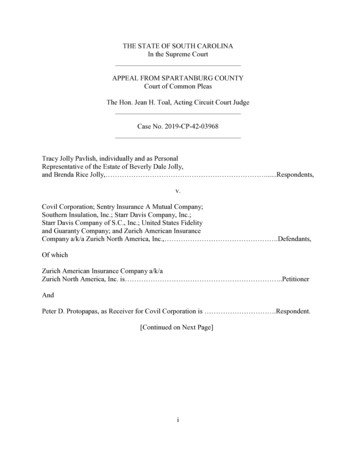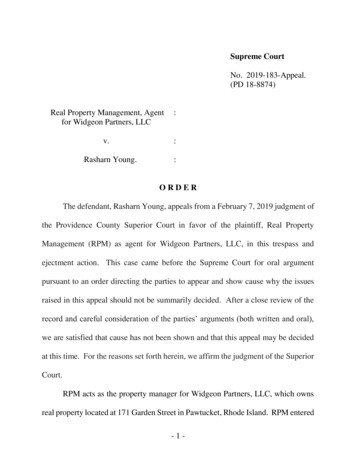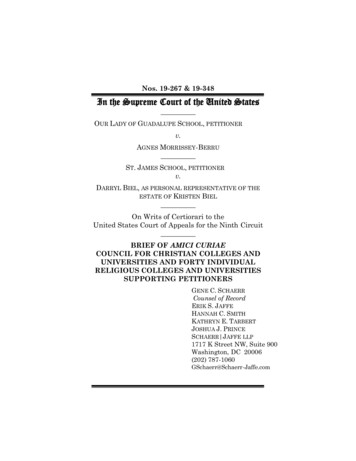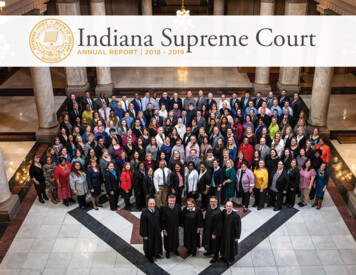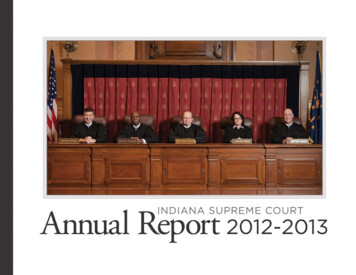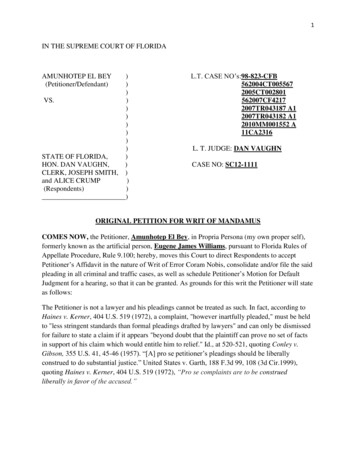
Transcription
1IN THE SUPREME COURT OF FLORIDAAMUNHOTEP EL BEY(Petitioner/Defendant))))VS.)))))))STATE OF FLORIDA,)HON. DAN VAUGHN,)CLERK, JOSEPH SMITH, )and ALICE CRUMP)(Respondents)))L.T. CASE F42172007TR043187 A12007TR043182 A12010MM001552 A11CA2316L. T. JUDGE: DAN VAUGHNCASE NO: SC12-1111ORIGINAL PETITION FOR WRIT OF MANDAMUSCOMES NOW, the Petitioner, Amunhotep El Bey, in Propria Persona (my own proper self),formerly known as the artificial person, Eugene James Williams, pursuant to Florida Rules ofAppellate Procedure, Rule 9.100; hereby, moves this Court to direct Respondents to acceptPetitioner’s Affidavit in the nature of Writ of Error Coram Nobis, consolidate and/or file the saidpleading in all criminal and traffic cases, as well as schedule Petitioner’s Motion for DefaultJudgment for a hearing, so that it can be granted. As grounds for this writ the Petitioner will stateas follows:The Petitioner is not a lawyer and his pleadings cannot be treated as such. In fact, according toHaines v. Kerner, 404 U.S. 519 (1972), a complaint, "however inartfully pleaded," must be heldto "less stringent standards than formal pleadings drafted by lawyers" and can only be dismissedfor failure to state a claim if it appears "beyond doubt that the plaintiff can prove no set of factsin support of his claim which would entitle him to relief." Id., at 520-521, quoting Conley v.Gibson, 355 U.S. 41, 45-46 (1957). “[A] pro se petitioner’s pleadings should be liberallyconstrued to do substantial justice.” United States v. Garth, 188 F.3d 99, 108 (3d Cir.1999),quoting Haines v. Kerner, 404 U.S. 519 (1972), “Pro se complaints are to be construedliberally in favor of the accused.”
2JURISDICTIONThis court has jurisdiction to issue writs of mandamus, prohibition, and certiorari, and any otherwrit in the exercise of its judicial authority. (See McFadden v. Fourth District Court of Appeal,682 So. 2d 1068 (Fla.1996).Additionally, the Jurisdiction of this Court is also invoked according to Article V Section 3(b)(7)and (8) of the Florida Constitution.STANDING (CAUSE OF ACTION)GROUND I: Judge Dan Vaughn’s failure to do his ministerial and/or judicial duty, (as anofficer/member of the court) by not accepting Coram Nobis jurisdiction over Petitioner’sAffidavit in the nature of Writ of Error Coram Nobis & a demand for dismissal or state theproper jurisdiction, filed on April 17, 2012, (see Exhibit A) constitutes a denial of access to thecourts, in violation of petitioner’s federally secured U.S. Constitutional Rights, guaranteed by the1st , 5th , 6th , and 14th Amendments.Judge Dan Vaughn has and had a duty to accept Coram Nobis jurisdiction over the petitioner’sWrit of Coram Nobis, because of these four reasons: (1.)petitioner was convicted and sentencedin Dan Vaughn’s court, on February 14, 2001, to 70.25 months state prison, in L.T. CaseNumber 98-823-CF, in which petitioner challenged the judgment of conviction(s), via Writ ofError Coram Nobis, on the basis of newly discovered evidence of jurisdictional issues of fact thatif known by the petitioner it would have changed the outcome of the proceedings; (2.) petitioneris no longer in state custody and can’t filed a 3.850 motion provided by Florida Rules of criminalprocedure, which has a 2 year statute of limitations for filing; (3.) Petitioner has proven acontinuing civil disability that justifies Coram Nobis jurisdiction, due to the fact that the felonyconvictions stemming from L.T Case Number 98-823-CF, has ruined petitioner’s life for themost part, because petitioner can’t get a decent job, can’t vote, can’t bare arms, and hisreputation has been ruined; and (4.) Petitioner filed Writ of Error Coram Nobis because he wasasking the court to correct newly discovered jurisdictional errors of fact and the Petitioner wasno longer in state custody, so he couldn’t file a 3.850 motion, under the Florida Rules ofCriminal Procedure, which has a 2 year statute of limitations. If this is not the case, Judge DanVaughn should have construed the said pleading into the proper legal vehicle in order to dosubstantial justice. (See United States v. Garth, 188 F.3d 99, 108 (3d Cir.1999), quoting Hainesv. Kerner, 404 U.S. 519 (1972), “Pro se complaints are to be construed liberally in favor of theaccused.” Furthermore, according to Latana vs. Hopper, 103 F. 2d 118; and Mcnutt vs. GMAC,298 U.S. 178, it matters not how the issue of jurisdiction is raised, and no enforcement canproceed until jurisdiction is proved.An invalid conviction, with its attendant stigma and inevitable consequence of thereafter labelingthe petitioner a felon, is an "error[] of the most fundamental character, . . . render[ing] theproceeding itself irregular and invalid." The writ of coram nobis should be issued when the
3indictment has failed to state a crime and the petitioner has exhausted his statutory right ofappeal. (See McNally vs. United States, 483 U.S. 350 (1987)The Supreme Court has restricted post-conviction review under a writ of coram nobis to"errors.of the most fundamental character, that is, such [that the error] rendered the proceedingitself irregular and invalid." (See United States v. Mayer, 235 U.S. 55, 69 (1914); see also UnitedStates v. Morgan, 346 U.S. 502, 511 (1954) (coram nobis relief available after release fromcustody).For the relation between the writs of habeas corpus and coram nobis, see United States v.Loschiavo, 531 F.2d 659 (2d Cir. 1976): "Even if 28 USC § 2255 were unavailable to[petitioner], in view of the fact that he had fully served his sentence under a federal felonyconviction, he could simply bring a petition for coram nobis under the 'All Writs' statute . . .,because such relief is available from the sentencing court even after release from custody."A continuing civil disability is the present and future impairment of some civil right, such as theright to vote or to maintain an occupational license. (See United States v. Keane, 852 F.2 199,203 (7th Cir. 1988), cert. denied, 109 S. Ct. 2109 (1989) (circumstances justifying coram nobisjurisdiction).United States v. Keogh, 391 F.2d 138, 148 (2d Cir. 1968) (coram nobis petition properlygranted only when court concludes that undisclosed evidence would have permitted defendant toraise reasonable doubt as to his guilt). Undisclosed evidence is newly discovered evidence.Coram Nobis was originally used to present newly discovered evidence that would have changedthe outcome of the proceedings.As a result of the foregoing denial of access to the court, the petitioner has suffered prejudice,because the relief the petitioner sought in his Affidavit in the nature of Writ of Error CoramNobis is not forthcoming and never will be until Judge Dan Vaughn does his duty as a judge,which is to review and/or hear the said pleading as a referee of justice.GROUND II: Judge Dan Vaughn’s failure to do his ministerial and/or judicial duty, (as anofficer/member of the court), by not acting upon petitioner’s motion for default judgment (seeExhibit H) constitutes a denial of access to the courts, in violation of petitioner’s federallysecured U.S. Constitutional Rights, guaranteed by the 1st , 5th , 6th , and 14th Amendments.The remedy the petitioner sought, which is and was Petitioner’s Motion for Default judgment, isprovided by Florida Rules of Civil Procedure, so Judge Dan Vaughn has rules governing thedisposition of the said pleading and it is clearly established, but yet, Judge Dan Vaughn isforever silent regarding the said pleading; mainly, due to fraud placed upon the court. “Silencecan only be equated with fraud where there is a legal or moral duty to speak or when an inquiryleft unanswered would be intentionally misleading.” (See U.S. v. Tweel, 550 F. 2d. 297 (5th cir.1977)). Fraud upon the court also warrants dismissal (see Hazel-Atlas Glass Co. v. HartfordEmpire Co., 322 U.S. 238 (1944)).
4As a result of the foregoing denial of access to the court, the petitioner has suffered prejudice,because the relief the petitioner sought in Petitioner’s motion for default judgment is notforthcoming and never will be until Judge Dan Vaughn does his duty as a judge, which is toreview and/or hear the said pleading as a referee of justice.GROUND III: The Clerk of the 19th Judicial Circuit, Joseph Smith, has failed to do hisministerial and/or judicial duty as the Clerk of the Circuit Court, by not filing petitioner’sAffidavit in the nature of Writ of Error Coram Nobis (when petitioner hand-delivered the saidpleading, on April 17, 2012, in the criminal and traffic division, on the 4th floor of the SaintLucie County Courthouse, Fort Pierce, FL.), in all listed criminal and traffic cases. Joe Smith’sfailure to do so constitutes a denial of access to the courts, in violation of petitioner’s federallysecured U.S. Constitutional Rights, guaranteed by the 1st, 5th, 6th, and 14th Amendments.Joe Smith should have filed petitioner’s Writ of Error Coram Nobis in the appropriate courts(Criminal/Traffic) with the appropriate judges in all listed case numbers, except for L.T. CaseNumber 11CA2316, because it is a civil case assigned to Judge Dan Vaughn. Petitioner addedL.T. Case Number 11CA2316 after he filed the said Writ of Error Coram Nobis, in an attempt toconsolidate all cases (see Exhibit F: Motion to Consolidate).As a result of the foregoing denial of access to the court, the petitioner has suffered prejudice,because the relief the petitioner sought in his Affidavit in the nature of Writ of Error CoramNobis is not forthcoming and never will be until Joseph Smith does his duty as a Clerk, which isto process all civil and criminal cases and prepare court records, and etc.GROUND IV: Judge Dan Vaughn’s failure to do his ministerial and/or judicial duty, (as anofficer/member of the court), by not granting petitioner’s motion to Consolidate (see Exhibit F )constitutes a denial of access to the courts, in violation of petitioner’s federally secured U.S.Constitutional Rights, guaranteed by the 1st , 5th , 6th , and 14th Amendments.Petitioner sought to consolidate L.T. Case Number 11CA2316 with all of his criminal felony,criminal traffic cases, and misdemeanor cases, because birth certificate fraud is alleged in thesaid case. The Birth certificate is the foundation of all identification, because it is the first pieceof identification. All other identification is based off of the Birth Certificate. “If the BirthCertificate is a fraud then all other means of identification that is based off of it is also a fraud.” Amunhotep El Bey (I came to this conclusion for my quote by using the fruits of a poisonoustree doctrine in the US Supreme Court’s landmark case in Wong Sun.)The Birth Certificate fraud mentioned in L.T. Case Number 11CA2316, gave the state of theFlorida the illusion of personal jurisdiction over the petitioner in all of the cases listed in theabove-styled cause, because it made the petitioner a subject, a citizen, illegally without fulldisclosure and without his consent; therefore, it is highly evident that all cases are related;especially, L.T. Case Number 11CA2316 and L.T. Case Number 98-823-CF, because both casesare state circuit cases with the same judge and with the same parties.
5As a result of the birth certificate fraud, the State of Florida, a corporation, was able to criminallysue the petitioner in all cases, because it gave the state personal jurisdiction over the petitioner bymaking him a citizen (subject), state property. If not for the birth certificate, prosecution wouldhave been illegal, because the court wouldn’t have jurisdiction to move the case forward, due toForeign Sovereign Immunity. The fraud of the Birth Certificate enabled the state of Florida toruin the petitioner’s life.L.T. Case Number 98-823-CF and all other criminal felony, criminal traffic, and misdemeanorcases are civil actions according to Federal Rules of Civil Procedure, Rule 2, “There is but onecause of action and that is civil.” Therefore, all L.T. cases are compatible with the civil actionfiled in L.T. Case Number 11CA2316.Furthermore, due to the fact that the state is in default judgment in all L.T. criminal, traffic, andmisdemeanor cases, all L.T. cases are now civil in nature – making them all compatible with thecivil action filed in L.T. case number 11CA2316.Additionally, Title 50 United States Codes (USC), Chapter 3, Alien Enemy, in appendix section23, Jurisdiction of the United States Court and Judges, is where criminal courts get therejurisdiction from. According to the said code, Criminal charges can’t be brought against thepetitioner because he is not an enemy alien resident; therefore the Lower Tribunal has and had noSubject matter jurisdiction to try him as a criminal defendant and the state of Florida has and hadno standing to bring a criminal law suit before the court as a criminal cases. By learning all ofthis information, one can reasonably conclude that criminal charges only apply to AlienEnemies, in which the petitioner is not and never has been an Alien Enemy. This paragraph alonevoids all judgments of convictions and it proves that all cases are indeed civil, unless one is anAlien Enemy. This is just another reason why the lower tribunal should have consolidated allcases, because petitioner has no criminal charges, because they don’t apply to him. Petitioner isnot an Alien Enemy and therefore does not qualify for criminal charges.Look at indictments and informations for further evidence that all actions are civil. If you look,you will notice that indictments and informations are styled in the nature of a civil action. This ismore reason why the lower tribunal should have consolidated all cases, because it is very evidentthat all actions are civil.If I was Joe Smith or Judge Dan Vaughn I would consolidate all cases to get rid of everything atone time, which would save money on the judicial process, and it would prevent the petitionerfrom seeking high
Amunhotep El Bey (I came to this conclusion for my quote by using the fruits of a poisonous tree doctrine in the US Supreme Court’s landmark case in Wong Sun.) The Birth Certificate fraud mentioned in L.T. Case Number 11CA2316, gave the state of the Florida the illusion of personal jurisdiction over the petitioner in all of the cases listed in the above-styled cause, because it made the .
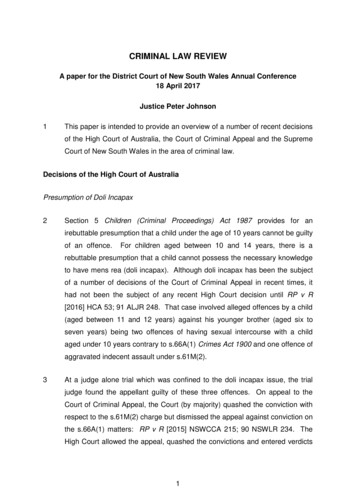
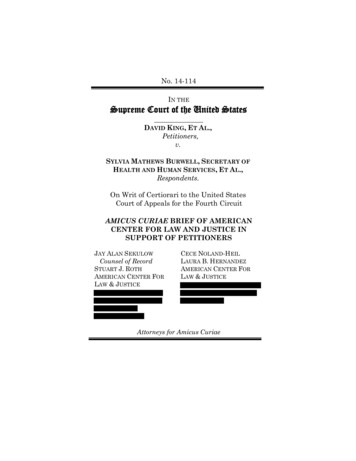
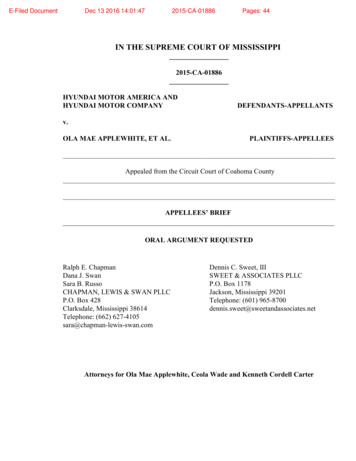
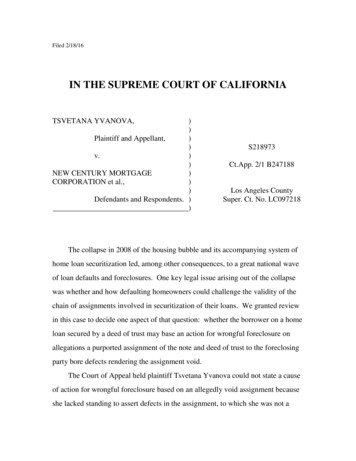
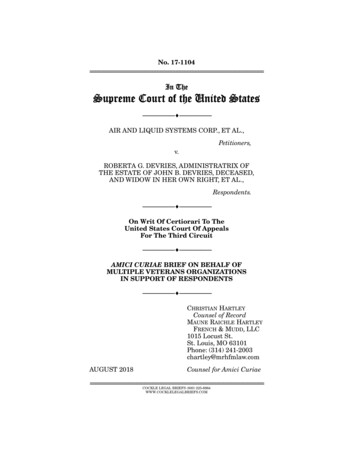
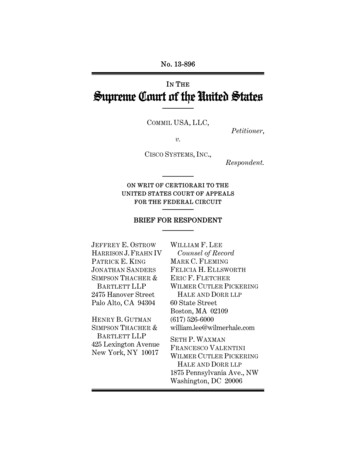
![IN THE SUPREME COURT OF T]-lE STATE OF MONTANA](/img/7/526b198c923f8.jpg)
